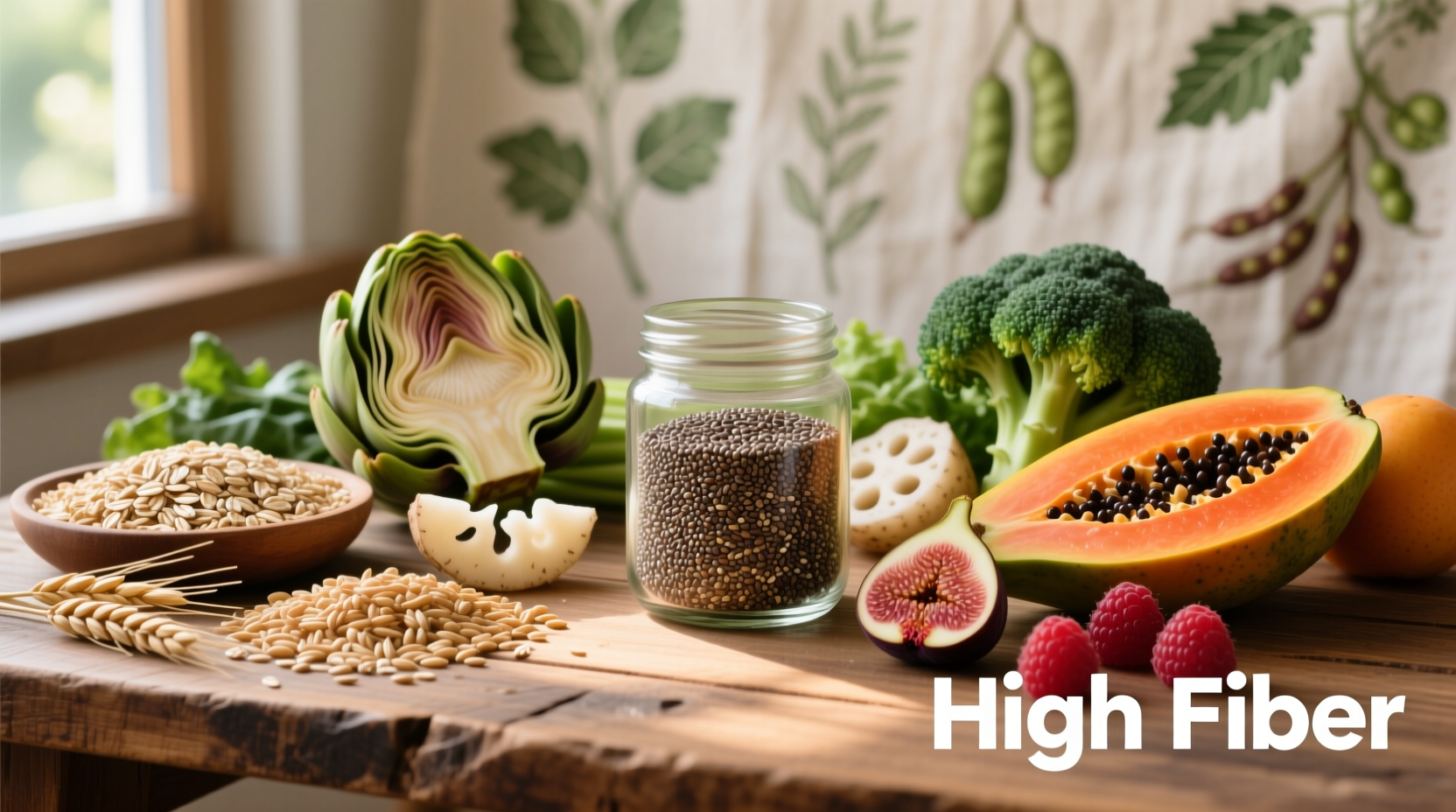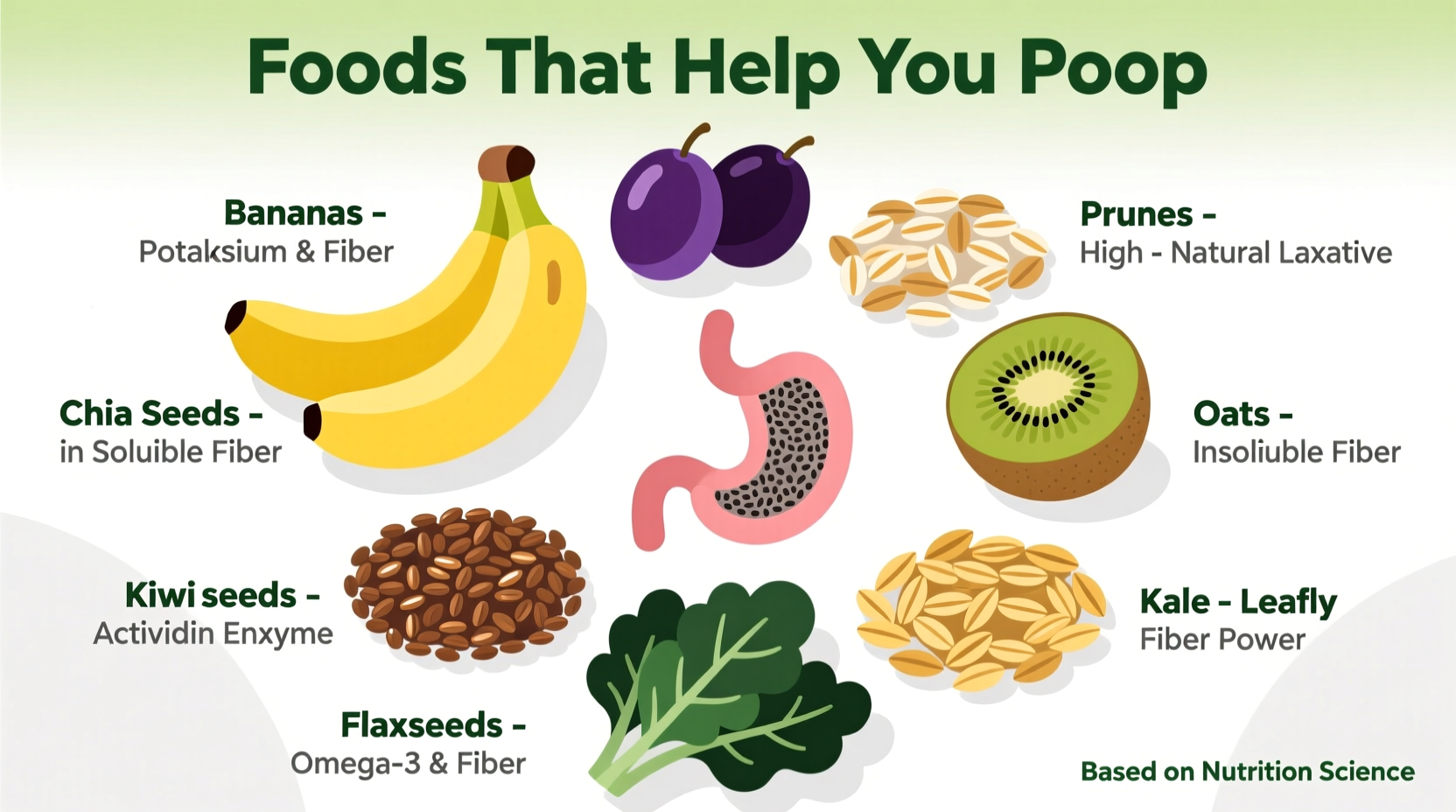Prunes, chia seeds, kiwi, flaxseeds, beans, leafy greens, and pears are the most scientifically supported foods that help you poop. These high-fiber options work by adding bulk to stool, stimulating intestinal contractions, and feeding beneficial gut bacteria for natural, effective constipation relief.
If you're searching for what are foods that help you poop, you're not alone. Millions experience occasional constipation and seek natural solutions before turning to medications. The good news? Your kitchen contains powerful remedies backed by nutrition science. This guide delivers evidence-based foods that promote regular bowel movements, explains exactly how they work, and provides practical strategies for immediate and long-term digestive health.
Immediate Relief: Foods That Work Fastest
When you're uncomfortable and need quick results, these foods deliver the fastest bowel movement benefits:
Prunes: Nature's Original Laxative
Prunes contain both soluble and insoluble fiber plus sorbitol, a natural sugar alcohol that draws water into the colon. A 2020 NIH study found that consuming 50g of prunes (about 5-6 prunes) twice daily significantly improved stool frequency and consistency within just 3 days. Unlike harsh laxatives, prunes provide gentle, natural relief without cramping.
Kiwi: The Surprising Digestive Powerhouse
Two medium kiwis contain 5g of fiber plus actinidin, an enzyme that stimulates intestinal motility. Research published in Advances in Nutrition demonstrated that eating two kiwis daily increased bowel movements from 1.8 to 3.0 per week in constipated adults. The combination of fiber, water content, and digestive enzymes makes kiwi exceptionally effective.
Chia Seeds: The Hydration Amplifier
These tiny seeds absorb 10-12 times their weight in water, forming a gel that softens stool and promotes easier passage. Just two tablespoons provide 10g of fiber. For immediate effects, soak chia seeds in water for 15 minutes before consuming to activate their water-binding properties.
| Food | Fiber per Serving | Time to Effect | Key Mechanism |
|---|---|---|---|
| Prunes (5-6) | 3.4g | 6-12 hours | Sorbitol + fiber combo |
| Kiwi (2 medium) | 5g | 12-24 hours | Actinidin enzyme + fiber |
| Chia seeds (2 tbsp) | 10g | 8-16 hours | Water-binding gel formation |
| Flaxseeds (2 tbsp) | 4g | 12-24 hours | Mucilage fiber + omega-3s |
Long-Term Solutions: Building a Constipation-Proof Diet
For lasting digestive health, incorporate these foods consistently rather than waiting until constipation strikes:
Beans and Legumes: The Fiber Champions
One cup of cooked black beans delivers 15g of fiber - more than half your daily needs. The combination of soluble and insoluble fiber feeds beneficial gut bacteria while adding bulk to stool. Start with smaller portions (1/4 cup) and gradually increase to avoid gas, always drinking plenty of water.
Leafy Greens: Magnesium Powerhouses
Spinach, kale, and Swiss chard contain magnesium, which draws water into the intestines and stimulates peristalsis. A cup of cooked spinach provides 160mg of magnesium - 40% of your daily requirement. For maximum effect, blend greens into smoothies rather than eating them raw.
Pears: The Perfect Balance
One medium pear with skin contains 6g of fiber plus pectin, which increases stool water content. Unlike some high-fiber foods that can initially worsen constipation, pears provide gentle, consistent relief. Eat them with the skin for maximum benefit.

When Food Alone Isn't Enough: Important Considerations
Certain conditions require medical attention rather than dietary changes alone. Consult a healthcare provider if you experience:
- Constipation lasting more than 3 weeks despite dietary changes
- Severe abdominal pain or bloating
- Blood in stool
- Unexplained weight loss
Hydration plays a critical role - without adequate water, high-fiber foods can actually worsen constipation. Aim for half your body weight in ounces daily (e.g., 75 ounces for a 150-pound person). Physical activity also stimulates intestinal contractions, so pair dietary changes with regular movement.
Avoid These Common Mistakes
Many people unintentionally sabotage their efforts to relieve constipation:
- Adding too much fiber too quickly - causes gas and bloating. Increase gradually over 2-3 weeks
- Not drinking enough water - fiber needs water to work effectively
- Over-relying on processed "high-fiber" products - whole foods provide better nutrient synergy
- Skipping meals - regular eating patterns stimulate the gastrocolic reflex
Putting It All Together: Your Action Plan
For immediate relief within 24 hours:
- Morning: Soak 2 tbsp chia seeds in 8oz water overnight; drink upon waking
- Breakfast: Add 1 tbsp ground flaxseeds to your cereal or smoothie
- Lunch: Include 1 cup of beans in your salad
- Snack: Eat 2 kiwis or 5-6 prunes
- Dinner: Serve leafy greens with your main course
For lasting results, maintain this pattern consistently while drinking adequate water and staying active. Most people notice improvement within 3-5 days of consistent implementation.











 浙公网安备
33010002000092号
浙公网安备
33010002000092号 浙B2-20120091-4
浙B2-20120091-4